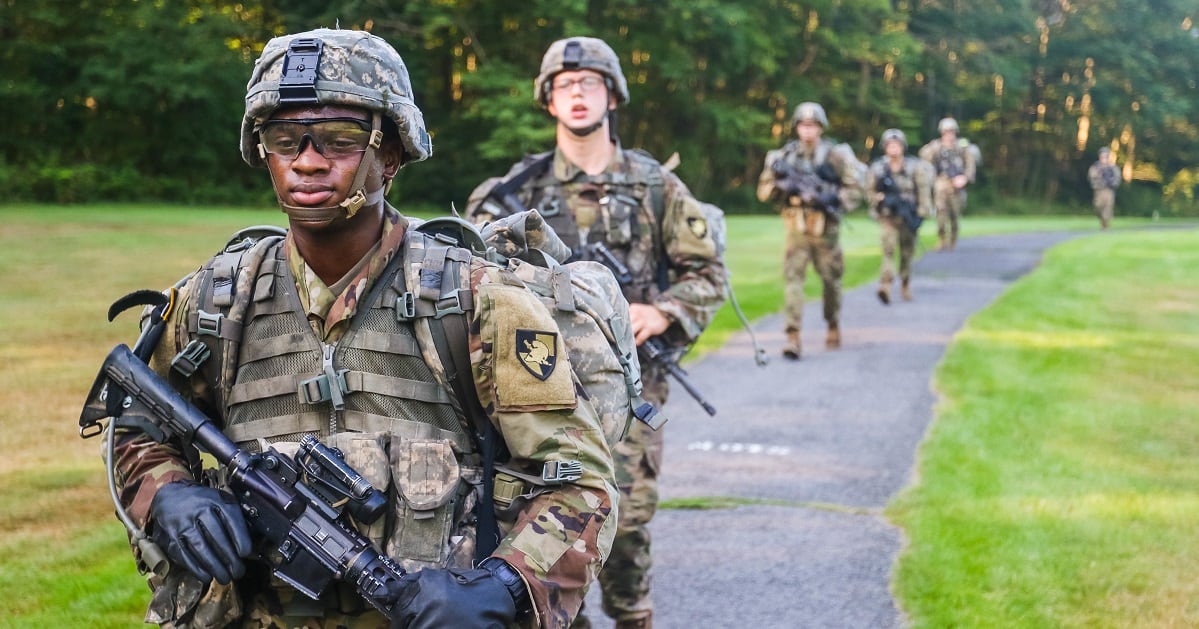Following alumni accusations this summer of racist treatment at the U.S. Military Academy at West Point, New York, cadets, staff and the head of a new advisory group highlighted efforts to foster “character growth” among cadets there.
Those initiatives have included a focus on racially based incidents, in which cadets shared their experiences, at the fourth annual “Honorable Living Week” in September. That event also included anti-bias training. West Point has also created a Character Integration Advisory Group, aimed at integrating honor, respect and trust programs within the cadet corps.
Cadets are also conducting a pilot program of cadet-led “tree talks” on social issues such as online conduct, sexual harassment and racial issues.
RELATED

The head of the group, director Jeffrey Peterson, spoke alongside Brig. Gen. Curtis Buzzard, the commandant of the Corps of Cadets, and Cadet Captain J.D. Davison, brigade respect captain, on a panel at the Association of the U.S. Army conference.
In June, nine West Point alumni submitted a 40-page policy proposal to address racism at the academy. The alumni said that as cadets they endured racial slurs and racially based harassment that was not properly investigated.
Within a week, West Point’s Inspector General’s Office began a “comprehensive review of all matters involving race,” academy spokesman Lt. Col. Christopher Ophardt told Army Times in July.
“I was called a ‘n-----’ during my plebe year,” said one cadet in testimony drawn from a spring 2020 survey. “When I reported it to my Tactical Officer, they instead accused me of lying and initiated an honor investigation against me.”
Another cadet said a student made a noose and put it on his “Black roommate’s desk as a joke.”
Others saw Black cadets receiving harsher punishments than their white counterparts.
“We take seriously all forms of racial inequality that marginalize or devalue members of our team. West Point does not accept, condone or promote racism,” Ophardt said in a statement at the time. “The West Point Inspector General has begun a comprehensive review of all matters involving race at the Academy. We will carefully consider the results of this review and deliberately address any findings.”
In September, the Honorable Living Week featured cadets recounting their own experiences involving racism and racial bias, both on and off campus.
Speaking at an AUSA event earlier that month, West Point Superintendent Lt. Gen. Darryl A. Williams said he welcomed feedback regarding potential problems or concerns at the academy.
“Oftentimes, we don’t stop and take time to listen. But it’s incumbent on leadership, once we’ve listened, that we take action. So we look forward to taking action,” Williams said. “We’re taking action now.”
At that time, the superintendent said that while previous Honorable Living Days had focused on sexual harassment and assault, the upcoming event would look at race-based problems.
Buzzard highlighted the work to reinforce the culture of honor, treating others with dignity and respect, recognizing issues of diversity and improving wellness and resiliency.
“And having the moral courage to intervene, this is really the cornerstone of building yourself as a leader of character,” Buzzard said.
In recent months, cadets have also been involved in “tree talks” where they sit outside and have one-to-one personal, informal discussions about a range of concerns.
Racism, mental health and resiliency were a few of the topics covered in the early portion of this past semester, Cadet John Cote wrote in an Army statement.
“Obviously, these issues won’t be solved by just talking, however, it is more efficient to tackle a problem when a better understanding is acquired,” Cote wrote.
Each cadet company was then tasked with writing up the group’s suggestions and solutions for cadet leadership. Then Cadet Leader Development personnel presented those to the West Point Board of Directors, which includes the superintendent, commandant, dean, athletic director, director of admissions and the academy’s chief of staff.
The events over the summer, and the subsequent focus at the September event, follow the revelation last December that the academy had opened an investigation into hand gestures, linked to white supremacists, that cadets used during a broadcast of ESPN’s College GameDay at the Army-Navy game Dec. 14.
The investigating officer concluded the cadets were playing a game, popular among teenagers, known as the “circle game,” and the intent was not associated with white supremacism, the academt announced a week later.
“We investigated this matter thoroughly,” said Williams, the academy’s superintendent. “Last Saturday we had reason to believe these actions were an innocent game and not linked to extremism, but we must take allegations such as these very seriously. We are disappointed by the immature behavior of the cadets.”
Just prior to the football game, West Point officials removed a motto from the academy’s spirit flag, in place since at least the 1990s, “God forgives, Brothers Don’t,” which also has been adopted by some racist groups.
Todd South has written about crime, courts, government and the military for multiple publications since 2004 and was named a 2014 Pulitzer finalist for a co-written project on witness intimidation. Todd is a Marine veteran of the Iraq War.




